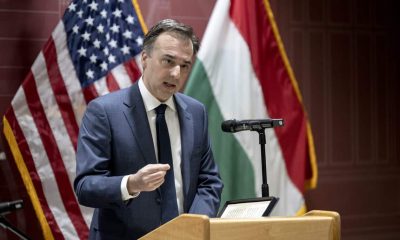US Ambassador Blasts Hungary’s Call for Ceasefire in Ukraine as ‘Cynical’

All Global Research articles can be read in 51 languages by activating the Translate Website button below the author’s name.
To receive Global Research’s Daily Newsletter (selected articles), click here.
Click the share button above to email/forward this article to your friends and colleagues. Follow us on Instagram and Twitter and subscribe to our Telegram Channel. Feel free to repost and share widely Global Research articles.
***
The top American diplomat in Hungary attacked Budapest for insufficient commitment to the NATO proxy war against Russia, with the ambassador claiming that support for a ceasefire in Ukraine was “cynical.”
US Ambassador to Hungary David Pressman made the remarks during the opening of the Hungary-Ukraine Relations Panel on Wednesday.
“It is cynical to call for a ceasefire when it is not your country that is almost 20 percent occupied by a foreign invading army,” he said. “The United States wants peace, one that is just and lasting. And that is precisely why we are standing shoulder to shoulder with the victims, with Ukraine.”
In February, Hungarian Prime Minister Viktor Orban called for a truce.
“[Russia] cannot win because the entire Western world has lined up behind [Ukraine],” he tweeted, “At the same time, [Russia] is a nuclear power and a nuclear power cannot be cornered because they may trigger a nuclear war. We need a ceasefire and peace talks. The sooner the better.”
“[Ukraine] is fighting valiantly and they have our full sympathy. But the only thing that can save lives in the [Ukraine War] is a ceasefire,” the PM added.
🇷🇺 cannot win because the entire western world has lined up behind 🇺🇦. At the same time, 🇷🇺 is a nuclear power, and a nuclear power cannot be cornered because they may trigger a nuclear war. We need a ceasefire and peace talks. The sooner the better. #RussiaUkraineWar pic.twitter.com/PU5X5h4kkH
— Orbán Viktor (@PM_ViktorOrban) February 23, 2023
Pressman went on to accuse Budapest of hindering dialogue between the North Atlantic alliance and Kiev.
“Amidst a land war in Europe, consultations with our partner Ukraine are vitally important to our shared security as Allies, and Hungary’s policy of standing alone in an effort to block high-level meetings of the NATO-Ukraine Commission is untenable,” he said in his speech on Wednesday, adding that this “will no longer be accepted.”
Hungary has taken issue with Ukrainian language laws which impact the 150,000 Hungarians living in the country, even vowing to block Kiev’s bid to join NATO over the legislation. The NATO-Ukraine Commission has not met since 2019 because of Budapest’s objections.
Last month, NATO civilian head Jens Stoltenberg declared that the alliance would go through with another meeting despite Hungary’s protests.
“This is an established framework. I have the mandate to convene it,” he said. “In respect for the issues that Hungary has raised I have not convened that for some time, but now I will continue to convene the meetings of the NATO-Ukraine Commission.”
*
Note to readers: Please click the share button above. Follow us on Instagram and Twitter and subscribe to our Telegram Channel. Feel free to repost and share widely Global Research articles.
Kyle Anzalone is news editor of the Libertarian Institute, opinion editor of Antiwar.com and co-host of Conflicts of Interest with Will Porter and Connor Freeman.
Featured image: Ambassador David Pressman’s Introductory Remarks at the Hungary-Ukraine Relations Panel Discussion

